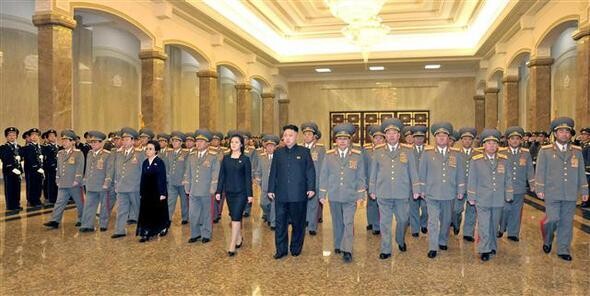hankyoreh
Links to other country sites 다른 나라 사이트 링크
State-run Chinese media defending Beijing’s handling of North Korea

By Park Min-hee, Beijing correspondent
China’s state-run media rushed to defend Beijing against charges of policy “failure” amid the fallout over North Korea’s third nuclear test last week.
Meanwhile, a battle of nerves is taking shape over China’s North Korea policy, with Beijing resisting calls from Seoul, Washington, and Tokyo for a harder line.
The Chinese state-run Xinhua news agency defended Beijing’s policy on North Korea in a Feb. 16 new analysis titled “Chinese experts see U.S.-DPRK antagonism as root cause of nuke test.” The piece blamed Washington instead, saying, “History has proven that a country threatened by force and sanctions would maintain and further develop its own military strength.”
“The United States should engage in serious reflection over this situation,” it continued.
Tsinghua University Institute of Modern International Relations vice-president Liu Jiangyong, said, “The argument that China’s DPRK policy has failed is ill-founded.”
He added, “Such arguments of some foreign media or on the internet are either provocation or have ulterior motives. The DPRK’s real target is the United States, not China or South Korea. On this issue, the United States, South Korea and Japan should be blamed for the failure of their policies. Those countries should reflect on what has happened.”
Ruan Zongze, vice president of the China Institute of International Studies, attributed, “the complexity of the nuclear issue on the Korean peninsula to the 60-year-old antagonism between the DPRK and the United States.”
He added, “In the future, distrust and antagonism between the United States and the DPRK should be resolved by mechanisms of multilateral dialogue like the six-party talks.”
The Global Times, another state-run daily, ran a Feb. 17 editorial titled “China needs to find right way to punish NK”, calling on Beijing to avoid siding with the US, Japan, and South Korea against North Korea.
“China should express its opposition against Pyongyang’s nuclear activities through actions. The international community won’t accept China’s blind protection of North Korea,” it said.
However, it went on to say that China “The reduction in China’s assistance to North Korea shouldn’t be more prominent than the increase in sanctions by the US, Japan and South Korea.”
It also said, “China is not in a position to undertake excessive adjustments in its North Korean policy, but it doesn’t mean there will be no change.”
Experts said the outcry from these media outlets was a clear sign that Beijing plans to continue prioritizing North Korean stability and the status quo over a resolution to the nuclear issue. South Korea, the US, and Japan are criticizing China’s insufficient pressure on North Korea, and even critics inside China are criticizing their government’s policies on Pyongyang.
Indeed, Japan’s Kyodo news agency reported on Feb. 17 on the first-ever Chinese demonstrations against the North Korea nuclear test. The protests, which took place as concerns about fallout from the test spread over the country’s microblogging systems, were held on Feb. 16 in front of North Korean consulates in Guangzhou, Guangdong, and Shenyang.
Some observers said the position voiced by Beijing may be connected with a more general climate of opposition with Washington that has been taking shape since the nuclear test, with the US and Japan speeding up their discussions on building a Northeast Asia missile defense system. According to a Feb. 16 report from Kyodo, US president Barack Obama told Japanese Prime Minister Shinzo Abe in a Feb. 14 phone conversation that he wanted to make the North Korean nuclear program a priority at the two leaders’ talks on Feb. 22.
Sources also reported that Obama and Abe plan to begin discussions on cooperating with Seoul on missile defense and to talk about security in the Asia-Pacific region.
Please direct questions or comments to [english@hani.co.kr]

Editorial・opinion
![[Column] Has Korea, too, crossed the Rubicon on China? [Column] Has Korea, too, crossed the Rubicon on China?](https://flexible.img.hani.co.kr/flexible/normal/500/300/imgdb/original/2024/0419/9317135153409185.jpg) [Column] Has Korea, too, crossed the Rubicon on China?
[Column] Has Korea, too, crossed the Rubicon on China?![[Correspondent’s column] In Japan’s alliance with US, echoes of its past alliances with UK [Correspondent’s column] In Japan’s alliance with US, echoes of its past alliances with UK](https://flexible.img.hani.co.kr/flexible/normal/500/300/imgdb/original/2024/0419/2317135166563519.jpg) [Correspondent’s column] In Japan’s alliance with US, echoes of its past alliances with UK
[Correspondent’s column] In Japan’s alliance with US, echoes of its past alliances with UK- [Editorial] Does Yoon think the Korean public is wrong?
- [Editorial] As it bolsters its alliance with US, Japan must be accountable for past
- [Guest essay] Amending the Constitution is Yoon’s key to leaving office in public’s good graces
- [Editorial] 10 years on, lessons of Sewol tragedy must never be forgotten
- [Column] A death blow to Korea’s prosecutor politics
- [Correspondent’s column] The US and the end of Japanese pacifism
- [Guest essay] How Korea turned its trainee doctors into monsters
- [Guest essay] As someone who helped forge Seoul-Moscow ties, their status today troubles me
Most viewed articles
- 1[Column] The clock is ticking for Korea’s first lady
- 2After 2 months of delayed, denied medical care, Koreans worry worst may be yet to come
- 3[Column] Has Korea, too, crossed the Rubicon on China?
- 4Samsung barricades office as unionized workers strike for better conditions
- 5All eyes on Xiaomi after it pulls off EV that Apple couldn’t
- 6[Correspondent’s column] In Japan’s alliance with US, echoes of its past alliances with UK
- 7US overtakes China as Korea’s top export market, prompting trade sanction jitters
- 8Hong Se-hwa, voice for tolerance whose memoir of exile touched a chord, dies at 76
- 9[Photo] Smile ambassador, you’re on camera
- 10[Editorial] When the choice is kids or career, Korea will never overcome birth rate woes